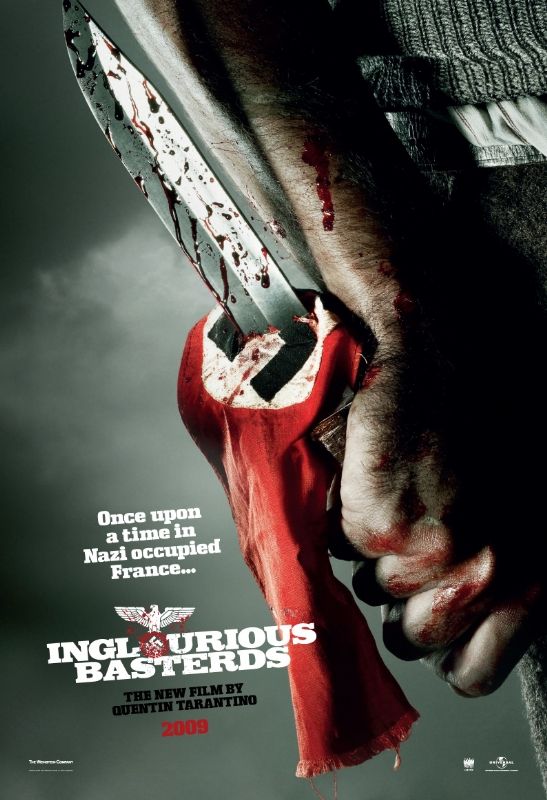 By Chase Kahn
By Chase KahnWhen gunfire arises in Quentin Tarantino's Inglourious Basterds, it doesn't just crackle or pop, it explodes. Clothing linens flutter about, shrapnel and sawdust from nearby walls, tables or floors suffocates the air and vivid red blood -- the same red that adorns the iconic Nazi flag -- erupts like a fireworks show's grand finale, abrasively but appropriately deafening.
Preceding the bloodshed is the usual stable of Tarantino's drawn-out, tongue-lashing dialogue that, this time around, is like a hand crank on the world's largest jack-in-the-box, wrung to an excrutiating degree before smacking you in the face.
Of course, Inglourious Basterds is Tarantino's latest effort in his line of niche-genre sendups that started with his Kung Fu double-bill (Kill Bill) and continued with his schlock-house horror talkie (Death Proof), which proved to simply be a platform to unleash Kurt Russell and a ten-minute car chase.
Basterds is many things, but mostly it's a WWII Spaghetti Western dressed up as a Jewish-revenge fantasy where a band of Allied-Jewish soldiers rein terror upon the Germans in Nazi-occupied France. From the opening credits, it's clear that this is a Tarantino flick through and through -- muddy guitar tracks, verbal stand-offs and visual staredowns all contribute the the feeling of watching a work by Sergio Leone or Tonino Valerii.
Sporting visual evidence of an attempted throat-slitting and a unique way with words (a sandwich becomes a "sannich"), Brad Pitt's Lt. Aldo Raine is a complete misfire for me. Obviously Pitt is having fun with the role, but it's almost too much the way he elongates words ("the edge of our kniiiivvves") and has a constant, unwavering expression of extreme discomfort that my be intestinal? Physical? Who knows? It's a go-for-broke performance and he's now broke.
Fortunately, most performances in the film are pretty good. French actress Melanie Laurent as a Jewish theater owner in search of revenge and Diane Kruger as a German actress-turned-rebel provide nice additions to the Tarantino canon of strong femme fatales. But the performance that's been praised endlessly (winning a supporting actor prize at Cannes) is that of Christoph Waltz as Hans Landa, nicknamed "Jew Hunter". An icon of villainy, he's a one-man regime -- a manipulator with words and a self-described "hawk" -- he's almost good enough to root for.
Naturally, Inglourious Basterds is split up into chapters and weaves multiple narrative threads into one before reaching its combustible and bloody finale at a French cinema theater. At times, Tarantino does appear to be a victim of his own formula (quirky credits, chapter headings and David Bowie's "Cat People", once revolutionary, now trite), but there is no denying that his images pop off the screen. Occasionally, Basterds is a pulpy delight.
In fact, some of it is so good that it makes you wish the whole thing didn't have a turgid air of smug self-satisfaction about it. The problem also remains, as it does for most in regards to Tarantino, that the man has become so buried in this image of tongue-in-cheek perpetrator of homage that all his films do -- at their most fundamental level -- is convince more people that yes, he watches a lot of movies.
Not only is the film itself a genre revival send-up of classical Ennio Morricone proportions, but even Tarantino's characters are blatantly in on it. They talk about movies, star in movies, run movie theaters and even act like they're in one. Both on the surface and in the subtext, Inglourious Basterds is just a big movie-loving orgy; take it for what it's worth.






No comments:
Post a Comment